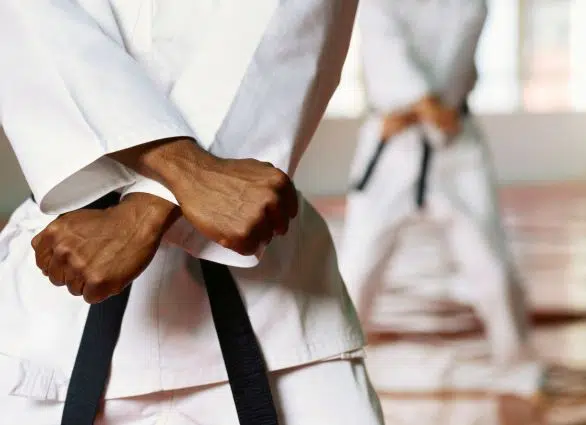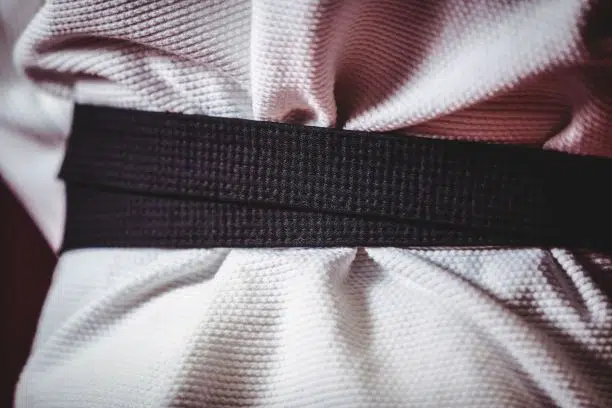I’ve been interested in whether it’s possible to start learning karate at 40. I did some research and here’s what I found.
So, can you learn karate at 40? You can learn karate at 40. As you age you take longer to recover from the rigors of training, so you’ll need to take it easier compared to a teenager or person in their 20’s. However, it’s a great way to stay in shape, make friends, and develop your confidence.
There are few considerations you need to take into account when deciding on doing karate in your 40’s and beyond, and there are many styles of martial arts that you might find appealing.
Read on, to discover what you need to consider before beginning karate in your 40’s, as well as, a broad overview of what the different martial arts offer.

Is There Any Age Limit To Learn Karate?
There is no age limit to learn karate. Whether you want to enroll your kids in a karate class or take one yourself, karate is a good way to learn some defensive strategies, release stress, and is a great way to keep fit.
There are many different types of karate, and each is unique. However, karate in my opinion has most of its focus on striking, with not much emphasis on the grappling side of martial arts. Compared to say wrestling, judo, or Brazilian jiu jitsu.
According to Harvard Medical School, as you get older, small injuries and pains take longer to heal than when you’re younger. As a result, you’ll need to take it slow in the beginning so that you can monitor how your body is responding to the training.
And increase or decrease the intensity of your training based on whether you’re getting injured. As long as you don’t train too hard, you can train every day of the week in your 40’s, without any issues.
Choosing The Right School For You
Some karate schools do lighter training with little to no sparring. Whereas, others will do light or even full contact sparring.
Wikipedia lists 15 different distinct styles of karate. In my opinion, a good idea is to learn about what the different karate styles in your area entail are to watch some videos on the history of it, where it originated, and their training style.
I remember when I took karate most of the focus was on doing kata – which are long strings of different moves. And there was no sparring or tournaments at all.
I have heard of others who did full-contact sparring karate, which is more similar to Muay Thai or boxing. And, as part of the training, you get kicked and punched on a regular basis.
Risk Of Brain Injury From Head Trauma
A study has now shown that you want to avoid as many hard strikes to the head as possible because it leads to brain damage.
Anecdotal stories from people who have been around martial arts since the 80’s and 90’s point to the fact that the training in those days was very hard.
And getting knocked out and taking heavy strikes to the head was seen as perfectly fine. You can run into schools, where this is still common practice, to hit each other in the head very hard.
Therefore, it’s important to be selective about what school you join. A good idea is to look up the local schools in your area, check out their website, Facebook page, and go and talk to the head instructor to get a feel for the vibe of the place.
A common thing that can come up at martial arts schools is that a bully vibe can develop. This is where the head instructor is the boss and keeps everyone in line with force and intimidation.
Whereas, other instructors are calmer and carefully screen and kick out students who are too rough on the other students.
Choosing The Right Style Of Karate
The style you ultimately decide on will be based on your unique needs, and there’s no blanket karate that is better than any other.
Here are a few considerations to think about when selecting a karate school:
- Whether they do any sparring as part of the training – is it full contact or touch sparring?
- Whether the head instructor and students are positive and easy to get along with (not a bully culture)
- Whether they compete in karate tournaments
As well as, other logistical considerations such as their timetable, and how close they are to where you live.

What Is The Best Martial Art For Over 40?
Each martial art has something unique to offer, and none is better than another for someone over 40. Judo, wrestling, and jiu jitsu are geared towards throws, takedowns, and using submissions. Whereas, karate, muay thai, taekwondo, and boxing are more geared towards striking.
As you age, your body is less resilient to hard impacts from throws and strikes, and your joints will remain sore after close run-ins with submissions.
So, it’s important to find a school that is respectful of that and doesn’t train so hard that you’ll be out for months at a time because of injuries.
My Personal Experience Training Martial Arts
I’ve been doing jiu jitsu now for about a year, and have been researching different martial arts and how they all fit in together.
Any martial art where the culture is to train light, and not go too hard on your training partners will give you more longevity in the sport. And also means you can train more regularly.
However, not all schools understand this, so you’ll need to talk with each individual school to get a feel for their philosophy and training style.
I think it’s important though to go hard and even full contact at least once in your life to see how a real fight is. But, there are significant health risks to doing so, and you should only do so when you feel comfortable, confident, and willing to do so.
Is 40 Too Old To Learn Martial Arts?
It’s never too late to learn martial arts and based on my research there are many people who even do Muay Thai fights in a ring that started when they were over 40. And many people come to martial arts later in life.
Especially nowadays with the popularity of the UFC, more people are becoming aware of martial arts.
Judo is particularly well known for having a strong philosophy of non-aggression, mutual trust, as well as, respect. Similarly, Muay Thai is taught in the traditional Thai way.
However, boxing, wrestling, and some jiu jitsu schools seem to me to have more bravado, and some academies tend to allow more aggression and rough training than others.
Which at any age isn’t a good idea, and at 40 it becomes even more important to avoid that kind of training.
In Conclusion
You can learn karate over 40. But, you want to choose the right dojo for you. Each dojo will have its own vibe based on the instructor, and students.
Some can be more reckless with the body, and you will get injured more. Whereas, others will train in a way that limits the wear and tear on the body.
When you’re over 40 you will heal more slowly than when you’re younger, so in my opinion, you want to train somewhere with a big emphasis on safety, and a culture that doesn’t allow bullying or training rough.
